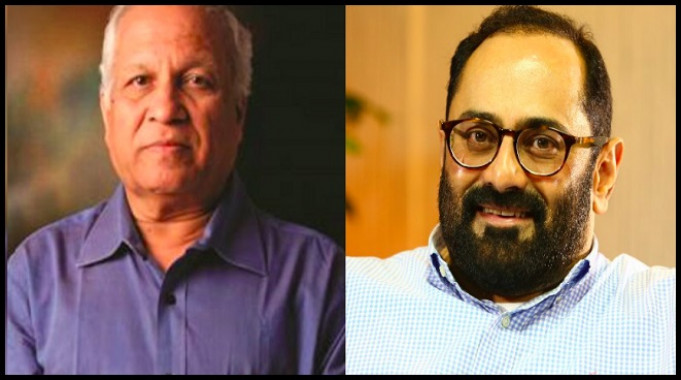Keeping politics and journalism apart
Reprinted from Scroll
Every time a journalist or a media owner gets nominated to the Rajya Sabha it evokes a passing bout of hand-wringing over journalistic independence. But look closer and you find that it is more a case of confirming an ideological or political affiliation that was already there, or of a professional journalist who for his own reasons is ready to move into politics for the solutions s/he thinks it offers.
Next week’s impending elections to the upper house for 58 seats has thrown up two names: the rather prominent ones of former Loksatta editor Kumar Ketkar, and businessman, media owner and independent member of Parliament Rajeev Chandrasekhar. The former has been offered an RS nomination from Maharashtra by the Congress Party, and the latter was thus far an independent MP from Karnataka supported by the BJP but has now been nominated by the BJP for another term.
How terrible precisely is the switch to active politics at a time when some TV channels are unabashedly partisan and are rewarded for their pains with exclusive interviews with the prime minister? You could argue that formal affiliation is worse than a bias. Does it compromise journalism? If you are an editor yes, If you are a media owner perhaps, but if you are a talking head on TV known for a certain ideological affinity, surely not that much?
And Kumar Ketkar would argue that that’s is where he fits in. He’s had similar offers from the Congress twice before but says he declined them then because he was chief editor of Loksatta and thought he should not go to RS, while still a working journalist. But that was five years ago. Twenty years ago he had a more colourful offer, from Balasaheb Thackeray who told him he could have a Rajya Sabha seat the next day if he was willing to shed his ideological affiliation.
Now he’s 72, not a working journalist any more he says, and is a little surprised that Rahul Gandhi is trying to induct someone who is not from Generation Next. And he doesn’t think keeping away from politics can contribute to keeping fascism at bay. Better to make the jump, then.
Swapan Dasgupta, now a BJP member of the Rajya Sabha similarly was part of the commentariat and still is. Journalists like him have long had identifiable political leanings so a party nomination does not change that much.
Nominating a practicing editor would be a different proposition except that the editors in the Rajya Sabha are usually owner-editors. Shahid Sidiqui who has had a long political career, moving through the Congress, Samajwadi Party and the BSP is one such. He owns the Urdu weekly he edits, and it also reflects his politics. Chandan Mitra who is the chief editor of Pioneer, is in essence running a publication with a recognizable political bias. So when he was a BJP MP in the Rajya Sabha there was no great disservice to journalism there either.
Harivansh, formerly of Prabhat Khabar, is an exception. He was the editor-in-chief of Prabhat Khabar when the JDU in Bihar surprised him with an offer in 2014. Like Ketkar had had offers of a Rajya Sabh nomination before, but from other parties. He was working in Jharkhand but was nominated for a Bihar seat. And decided that he was ready to make the switch to politics. It took close to two years for his paper’s owners to get others in place, so there was a period when he was both editor and MP. But his name was removed as chief editor from the print line of the paper two months after he took oath as MP. Now that his journalistic career is over he can focus on why he moved to politics in the first place.
Because, he says, “whatever great journalism you do the system does not change.” His paper broke several scams including the fodder scam, it did great investigative journalism, but there was no systemic change. But now he is discovering that you cannot change things through Parliament either. “I thought I was moving to a platform where you can raise issues. I raise an issue in Parliament, but eventually nothing happens…I thought it was a forum where serious issues could be raised but there has been no business transacted over the past week”.
The dalliance between individual journalists and politics has a long colourful history. Pritish Nandy was given a Shiv Sena nomination to the RS by Balasaheb Thackarey, Rajiv Gandhi persuaded M J Akbar to fight a Lok Sabha election, Cho Ramaswamy has been a Raja Sabha MP nominated by the BJP, as was Ranchi Express owner-editor Ajay Maru.
The relationship between some media owners and the Rajya Sabha has stretched over longer spans: KK Birla, proprietor of the Hindustan Times, was a Rajya Sabha MP for 18 years, his daughter Shobana Bharatiya was a nominated MP more recently. The Guptas of Jagran Prakashan which publishes Dainik Jagran managed nominations in succession from two different parties, the BJP and the Samajwadi party, in earlier years, but have not had a seat in the Upper House in recent years. Vijay Darda was chairman and editor in chief of Lokmat while serving three terms in the Rajya Sabha. Subhash Chandra of Zee has just begun his innings, and given how entrenched his media house is with the ruling BJP, it could be a long one.
Media houses think their empires can benefit from closeness to those in power, political parties think access to a friendly media empire is a useful thing.
Keeping politics and journalism apart is fortunately still the rule, but it looks like the exceptions are set to increase.
Sevanti Ninan edits The Hoot.







